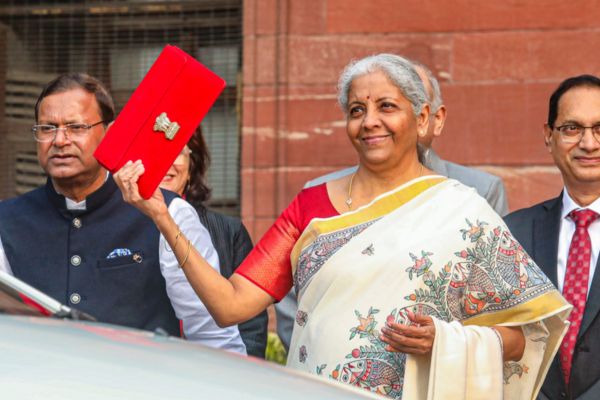The Union Budget 2025 has set the stage for a transformative shift in India’s digital and economic landscape, with significant allocations towards AI, deep tech, clean energy, and cybersecurity. Industry leaders from across sectors have welcomed the government’s forward-looking approach, highlighting the potential impact of the ₹20,000 crore Deep Tech Fund, enhanced R&D incentives, and MSME-focused policies. As AI adoption scales, clean energy manufacturing gets a boost, and cybersecurity talent development gains momentum, India is poised to strengthen its global leadership in innovation and technology-driven economic growth.
Anand Sahay, Global CEO, Xebia
“The Union Budget 2025 signals a pivotal moment for AI-driven economic growth. The ₹20,000 crore Deep Tech Fund and private-sector R&D push are important steps, but execution will define their true impact. AI must move beyond pilots and become a core part of business strategy, efficiency, and competitiveness.
India’s greatest strength is its vast STEM talent and rapidly expanding AI-skilled workforce. With Global Capability Centres growing beyond metros, AI adoption is no longer limited to specific industries—it is transforming BFSI, manufacturing, retail and other industries at scale.
The priority now is scaling AI where it delivers measurable business impact. AI automation, supported by a skilled workforce and clear regulatory frameworks, will drive new revenue streams, optimize costs, and set new efficiency benchmarks. Businesses that integrate AI into core operations today will lead in the AI-driven economy.
At Xebia, we don’t see AI as an experiment—we see it as the foundation of business transformation. Scalable, responsible AI adoption will define India’s leadership in the AI economy.”
Mr. N.P Ramesh, COO and Co-Founder of Orb Energy
“With the 2025 budget announcement, Finance Minister Nirmala Sitharaman has set a clear path for India’s clean tech revolution. The National Manufacturing Mission aims to accelerate domestic production of solar cells/panels, and EV storage batteries ensuring that India not only strengthens its ‘Make in India’ vision but also becomes a key player in global supply chains. The reduction of BCD on Lithium batteries is a very welcome step, as Storage goes along with increased adoption of renewable energy.
Alongside this, the focus on Industry 4.0 opens up exciting opportunities for our youth to lead the charge in innovation, creating a sustainable and energy-efficient future for generations to come. This is more than just a step toward economic growth—it’s a bold move to make India a global hub for clean energy solutions, driving job creation, reducing dependence on imports, and ultimately contributing to India’s clean energy goals”.
Vishak Raman, Vice President of Sales, India, SAARC, SEA and ANZ at Fortinet
“‘Viksit Bharat’ lays out a clear road map for developing the skills sets of our future workforce to accelerate growth with skilled labour and meaningful employment. The emphasis on scientific thinking is seeded at the school level with the setting up of Fifty thousand Atal Tinkering Labs to cultivate a culture of Innovation among young minds. This goes all the way to funding ten thousand fellowships at IITs and IISc for technology researchers at the highest level.
Five National Centres of excellence in skilling with global expertise is a good example of private public partnership to ensure the best curriculum for manufacturing. We also now have a fourth Centre of Excellence in Artificial Intelligence for education and this investment clearly outlines we need a pool of talent that will help us to exploit the potential of AI in various fields.
We welcome the 50% duty cut on switches for telecom as this will reduce the cost of secure networking for the service providers. The cybersecurity skills gap remains a major concern as we continue to struggle in securing our digital assets. In the area of cybersecurity training and upskilling we at Fortinet are at the forefront of addressing the skills gap and are closely working with CERT-IN and AICTE where one lakh internship is on offer to professionals interested in starting a career in cybersecurity.
IT and Technology Expertise will continue to drive economic growth with the Deep Tech Fund of Funds for start-ups supporting first time entrepreneurs to innovate and ideate new business opportunities. The four powerful budget engines chug along very nicely for Agriculture, MSME, Investment and Export growth taking everyone along on this journey of prosperity and resilience.”
Genie Sugene Gan, Director of Government Affairs & Public Policy, Kaspersky
“The Union Budget 2025 presents a forward-looking vision for India’s digital economy, reinforcing the country’s commitment to cybersecurity, innovation, and resilience. The government’s focus on ease of doing business, financial incentives for MSMEs, and investment in deep-tech and AI-powered Centers of Excellence will create an enabling environment for India’s cybersecurity ecosystem
The introduction of a Deep Tech Fund, along with increased support for startups through the Export Promotion Mission, will accelerate India’s transition into a global technology powerhouse. The budget’s emphasis on digital public infrastructure, investments in national geospatial missions, and streamlined tax compliance that will support data security frameworks, creating new opportunities for public-private collaborations in cybersecurity.
Kaspersky is looking ahead to the government’s push toward a trust-first, scrutinize-later approach, making it easier for businesses to operate transparently while driving compliance.
As India strengthens its cybersecurity posture through continued investments in innovation, AI, and digital trust frameworks, Kaspersky remains dedicated to supporting India’s cybersecurity ecosystem and ensuring a safer digital future.”
Mr. Anuj Kumbhat, Founder & CEO, WRMS
“The Union Budget 2025 stands on an assured foundation for digitally enabled, resilient, and growth-driven India. With MSMEs making up approximately 45 % of the total export contribution of the country, provisions made by the government for MSMEs on enhanced classification limits, credit support, and ease of doing business reforms shall put small businesses in scaling mode. It will unleash entrepreneurial opportunities, create jobs, and boost the economy.
Equally encouraging is the emphasis on technology- a deep-tech fund of funds, investments into Centre Excellence in AI, and digital public infrastructure for international trade. Together, they have the potential to spur further innovation and position India as a global leader in technology. Simplifying taxation, encouraging exports, and refining the regulatory framework would go a long way in boosting India’s global competitiveness.
At WRMS, we embrace these progressive steps with an instinctive optimism as we hope to ride these opportunities to develop impactful solutions of cross-sectoral significance for businesses.”

















